The Sacred Spirit Blu-ray Movie
HomeThe Sacred Spirit Blu-ray Movie 
Espíritu sagradoArrow | 2021 | 97 min | Not rated | Jul 19, 2022
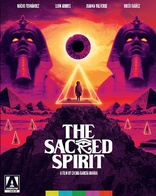
Price
List price:Amazon: $14.99 (Save 25%)
Third party: $14.99 (Save 25%)
Only 13 left in stock - order soon.
Movie rating
6.3 | / 10 |
Blu-ray rating
| Users | 0.0 | |
| Reviewer | 4.5 | |
| Overall | 4.5 |
Overview
The Sacred Spirit (2021)
Julio is dead. It's terrible news for OVNI Levante, the association of ufology aficionados that he ran. The death hits one its members, José Manuel, particularly hard. Julio and he had a secret project to change human destiny. Now he must carry on alone.
Starring: Llum Arques, Nacho Fernández, Rocío Ibáñez, Joanna ValverdeDirector: Chema García Ibarra
| Foreign | Uncertain |
| Drama | Uncertain |
| Sci-Fi | Uncertain |
| Comedy | Uncertain |
Specifications
Video
Video codec: MPEG-4 AVC
Video resolution: 1080p
Aspect ratio: 1.59:1
Original aspect ratio: 1.66:1
Audio
Spanish: DTS-HD Master Audio 5.1
Spanish: LPCM 2.0
Subtitles
English, English SDH
Discs
Blu-ray Disc
Two-disc set (2 BDs)
Packaging
Slipcover in original pressing
Playback
Region free
Review
Rating summary
| Movie | 4.0 | |
| Video | 4.5 | |
| Audio | 4.0 | |
| Extras | 5.0 | |
| Overall | 4.5 |
The Sacred Spirit Blu-ray Movie Review
Reviewed by Jeffrey Kauffman July 12, 2022 Note: There is one potential spoiler early in the following plot summary, though as is discussed, it's actually revealed in the film's own
opening moments.
Despite its title and key art that suggest something potentially supernatural, there's very little that might under normal circumstances
be
termed either "sacred" or "spiritual" in The Sacred Spirit, and in fact despite a prevalence of Egyptian symbology (more about that in a
moment), the actual story really
turns out to feature a somewhat tawdry and perhaps even rote horror plot involving abducted children and organ harvesting. Now that
might
seem like a major spoiler, but as several of the copious supplements on this two disc set make clear, both the kidnapping and harvesting
aspects are raised within seconds of the film's opening, though under somewhat discursive conditions. A very tightly framed shot offers a
little girl named Verónica (Llum Arqués) who, in a preternaturally serious voice, begins a report about child abductions and devil
worshipping
organ harvesters, although the "discussion" is couched in some unabashedly politically incorrect terminology, which perhaps makes Verónica's
comments simultaneously both
somewhat comical and completely disturbing. As Alexandra Heller Nicholas points out in her interesting visual essay included on disc one of this set
(just one of two visual essays about the film on that disc), that tight framing continues when the next student, who is considerably taller
than Verónica, steps up to deliver her report, which means that the top of the little girl's head, and specifically her eyes, are out of the
frame. It's subliminally unsettling, but already writer and director Chema García Ibarra is toying with audience expectations, both with regard to
story
but also with regard to structural elements like what is seen (or not seen). And in fact "seeing" in its various connotations is a recurrent
element in this odd, discomfiting tale.
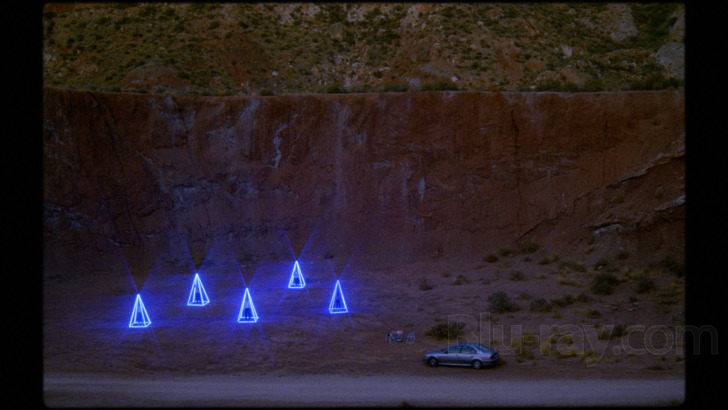
The film quickly moves on to what would under "normal" conditions seem like two completely disparate elements. Verónica is seen with her mother Charo (Joanna Valverde) and soon in a vignette that Alexandra Heller Nicholas mentions kind of uniquely subverts being able to actually see what's going on, Ibarra frames the two being interviewed for a local newscast about missing children, with the interviewer's camera front and center, effectively blocking a lot of the frame. The salient non-structural piece of information here is that Verónica has a twin sister named Vanessa who has sadly gone missing, and the family is reaching out for help finding her. That newscast provides the first of several interesting segues that Ibarra utilizes, as the scene moves from the interview being shot to it being broadcast on the television of a bar business owned by another focal character, José Manuel (Nacho Fernández).
José Manuel it turns out is Charo's brother, and so is uncle to both the missing Vanessa and Verónica, but he also provides the entré to the other major plot aspect, namely a bunch of seemingly almost comical ufologists who have a peculiar love for Egyptology. This would seem to be a completely gonzo element to add into a story that is fraught with more "kitchen sink" dramatic tension, but kind of amazingly, Ibarra manages to weave the missing child (and unsurprisingly children) aspect into a tale that involves those who, for want of a better term, see what they want to see. The imagery here is virtually drowning in ocular allusions, and there's a rather interesting dialectic set up somewhat later in the story that kind of hilariously pits the Egyptian Eye of Horus against the so-called Eye of Providence, whose name might not be familiar but whose imagery is imprinted on American currency.
The story has a number of fascinating sidebars which fill in both the missing child and Egyptian side of things, including José Manuel's "glorious leader" type at the UFO group, a guy named Julio (José Ángel Asensio), and Charo's mother Carmina (Rocío Ibáñez), an elderly woman who was once a celebrated psychic but who has fallen prey (or has she?) to dementia. This is barely the tip of a narrative iceberg that reveals a whole host of hidden layers, though the ultimate effect is unabashedly horrifying. It's really interesting to revisit one particular sequence very late in the film, when the enormity of some of José Manuel's efforts (I'm being deliberately oblique) has become clear and an almost Hitchcockian moment ensues where the audience knows way more than one other character in the scene.
There are also other moments of filmmaking virtuosity and use of audacious imagery. One involves a tracking shot following behind José Manuel, who is trying to dispose of some items, which kind of strangely doesn't follow the character when he juts off suddenly, and which instead continues on to ultimately include a whole gaggle of other people walking. Like much else in the film, this moment remains an "unexplained mystery", but it provides a really weird, dissociative feeling for a minute. Also an absolutely riveting and unusual sequence occurs late in the film in what in any other offering would be called an "info dump", but which is offered here in such a unique way that I won't describe it any further, other than to say this particular "info dump" is more or less silent. Another interesting moment is in the film's closing seconds, which feature an inflatable Sphinx (who knew there were such things?) filling with air, but with other activity in the frame.
As provocative as all of this is, and this is an undeniably audacious effort by any measure, I have to say the curmudgeonly metaphysician and/or symbologist in me just couldn't quite buy some of what's being proffered here. But in a way that hardly matters as it seems the Ibarra is really not making a statement about any given belief (and/or beliefs), but rather Man's kind of baffling ability to be distracted by "shiny objects" (metaphysical, alien or otherwise) when something quite horrifying is happening almost literally right in front of their eyes.
The Sacred Spirit Blu-ray Movie, Video Quality 
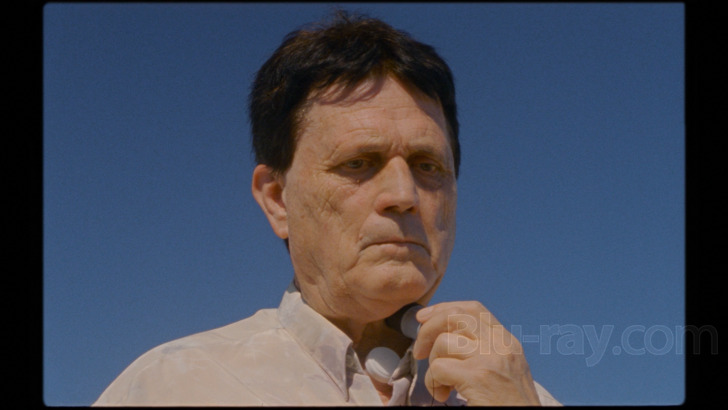
The Sacred Spirit is presented on Blu-ray courtesy of Arrow Video with an AVC encoded 1080p transfer in 1.59:1. Arrow's insert booklet contains only pretty generic verbiage about the transfer:
The Sacred Spirit is presented in its original aspect ratio of 1.78:1 [sic] with 5.1 DTS-HD Master Audio sound. The High Definition master was supplied by Heretic.Despite the discrepancy between the "advertised" aspect ratio and what's on the disc, there are no framing issues that I noticed, and it's perhaps salient to note that the IMDb lists the film's original aspect ratio as 1.60:1. Ibarra shot this on 16mm, and it has a suitably gritty, lo-fi ambience that fits well with the increasingly sordid aspects of the plot. In terms of palette suffusion and fine detail levels, there's probably no arguing that the most brightly lit outdoor material fares the best, and in fact some of the sun drenched material offers a really robust accounting of primaries in particular and some impressive and consistent detail levels. Things can falter a bit in some of the more dimly lit material, both exterior and interior, and a few interior scenes in particular have a kind of slightly sickly yellow-green tinge that can give flesh tones a somewhat odd appearance. The presentation looks nicely organic throughout, and for a "vintage" artifact from days of yore, I refer you to the charming hair stuck in the gate on the bottom left of the frame in screenshot 19.
The Sacred Spirit Blu-ray Movie, Audio Quality 
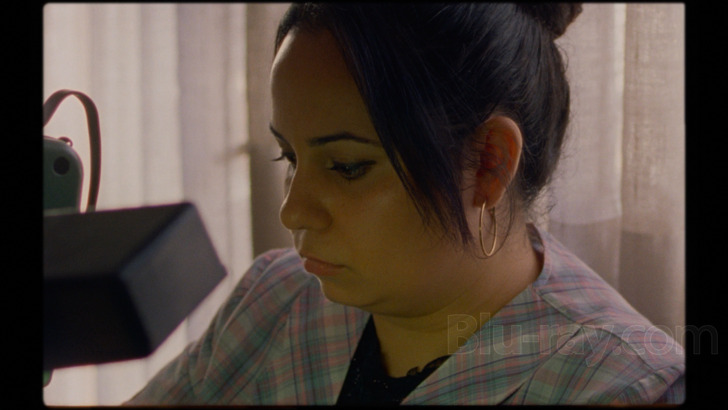
The Sacred Spirit features DTS-HD Master Audio 5.1 and LPCM 2.0 audio options in the original Spanish (a drop or two of English sneaks in surreptitiously). The sound design here is occasionally rather nicely layered, and some of the surging cues which are (for want of a better term) a little "farty" sounding offer good dynamic range and immersion. Ambient environmental sounds are also well placed in the side and rear channels in some of the exterior scenes in particular. Dialogue is rendered cleanly and clearly throughout. Optional English subtitles are available.
The Sacred Spirit Blu-ray Movie, Special Features and Extras 
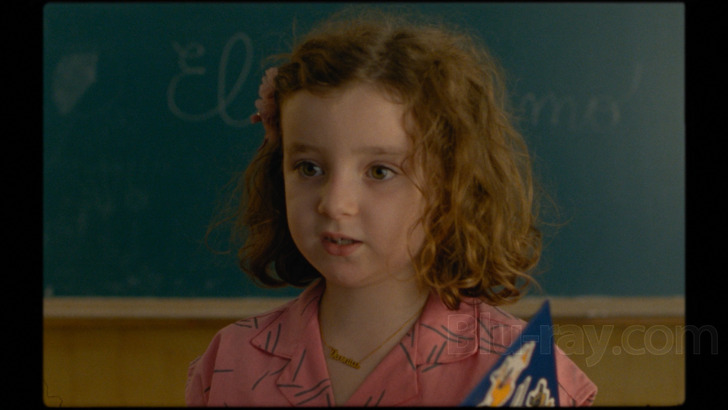
Disc One
- Beyond the Eye of Horus (HD; 16:53) is the first of two visual essays on this disc, this one by Alexandra Heller Nicholas, who documents the film's emphasis on eyes.
- Pyramid Scheme (HD; 20:59) is the second visual essay, this one by Josh Nelson, who also explores some of Ibarra's other films. Kind of humorously, this piece has a spoiler warning, while Heller Nicholas' does not, and I'd say hers has at least as many giveaways as this one.
- Domestic Science Fiction (HD; 18:46) is an interview with Garcia Ibarra. In Spanish with English subtitles.
- Behind the Scenes
- Cinematographer and Production (HD; 2:28)
- Director (HD; 2:33)
- Production Design (HD; 2:16)
- Cast (HD; 2:25)
- Elche Vision offers Lorena Iglesias as reporter Esther Armengol.
- Episode 1 (HD; 1:40)
- Episode 2 (HD; 2:50)
- Episode 3 (HD; 1:40)
- Episode 4 (HD; 1:51)
- Episode 5 (HD; 1:28)
- Episode 6 (HD; 1:22)
- Characters Presentation is a group of odd little snippets that play kind of like home movies or quasi interviews.
- Grandma (HD; 00:15)
- Andrea (HD; 00:18)
- Jose Manuel (HD; 00:08)
- Mum (HD; 00:15)
- The Bad (HD; 00:15)
- Raul (HD; 00:19)
- Lady (HD; 00:19)
- UFO (HD; 00:18)
- Raul Navarro (HD; 00:18)
- Uninterrupted TV Broadcasts offers unedited versions of elements seen on various screens throughout the film.
- Advert: Miguel Porras - Consultancy and Legal Services (HD; 00:35)
- News: Shoemakers Demonstration (HD; 1:47)
- News: Explosion (HD; 1:02)
- Magazine: Easter Special (HD; 3:21)
- Theatrical Trailer (HD; 1:36)
- Image Gallery (HD)
- The Attack of Robots from Nebula-5 (2008) (HD; 6:18)
- Protoparticles (2013) (HD; 7:15)
- Mystery (2013) (HD; 12:04)
- Uranes (2014) (HD; 59:14)
- The Disco Shines (2016) (HD: 12:12)
- The Golden Legend (2019) (HD; 11:07)
The Sacred Spirit Blu-ray Movie, Overall Score and Recommendation 
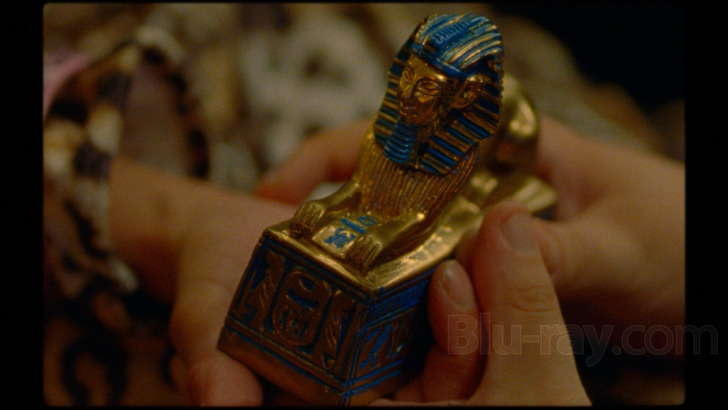
As I've mentioned (confessed?) in some reviews of other films featuring at least tangential connections to the occult, part of my misspent youth was involved in some pretty deep dives into the work of Aleister Crowley and William Butler Yeats, in anticipation of writing a Masters Thesis about their wives, each of whom supposedly engaged in "automatic writing", a thesis which due to the vagaries of making a living never quite got completed. However, anyone who has ever spent much time with Crowley's output in particular will know how important Egyptian mythology was to him, and in fact there are whole nooks and crannies of Thelema (Crowley's supposed "religion") devoted to the interactions between Osiris, Horus and Isis. I kind of wished Ibarra had exploited some of this pre-existing (if admittedly occult in more than one sense of the word) material rather than "reinventing" the Eye of Horus for his own uses, and subverting things considerably in the process. That said, Ibarra frankly probably could have used any symbol that a cult has glommed on to, and the underlying context of belief and "seeing" is what really drives this film. The Sacred Spirit is very odd, and I'm frankly not sure it really totally holds together, but it's incredibly disturbing and in its own way unforgettable. Technical merits are solid and as usual Arrow has provided a really sumptuous array of supplements. Recommended.
Similar titles
Similar titles you might also like

Human Animals
Animales racionales
1983

Rosalie Goes Shopping
1989

The End of Man
Finis Hominis - O Fim do Homem
1971

The Untamed
La región salvaje
2016

Story of a Cloistered Nun
Storia di una monaca di clausura
1973

The True Story of the Nun of Monza
La vera storia della monaca di Monza
1980

To Be Twenty
Avere Vent'anni
1978

Savage Summer
Verano Salvaje
1980

Wages of Sin
The Price of Sin / Forbidden Fruit: The Golden Age of the Exploitation Picture, Vol. 10
1966

Cristiana Devil Nun
Cristiana monaca indemoniata
1972

Shame
Schande / Slipcover in Original Pressing
1988

The Five Days 4K
Le cinque giornate / The Five Days of Milan
1973

Men Behind the Sun 3: Narrow Escape
Hēi tài yáng 731 wán jié piān sǐ wáng liè chē / 黑太陽731完結篇:死亡列車
1994

Fairy in a Cage
檻の中の妖精 / Ori no naka no yôsei / The Nikkatsu Erotic Films Collection
1977

Nothing Bad Can Happen
Tore Tanzt / Tipota kako de tha symvei / Rising
2013

Why Don't You Just Die!
Папа, сдохни / Papa, sdokhni
2018

Attack of the Robots
Cartes sur table
1966

The Host
괴물 / Gwoemul
2006

Take Me Somewhere Nice
Slipcover in Original Pressing
2019

Being Natural
2018